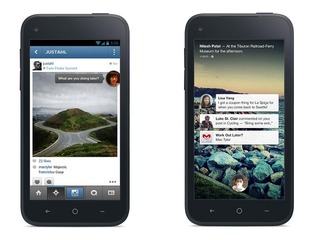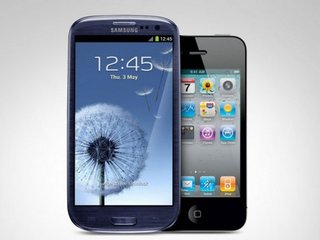Every Cure and BioPhy launch partnership on drug repurposing
EveryCure will leverage BioLogicAI, BioPhy’s predictive AI engine, to assess drug-disease matches
Read more...
When Facebook debuted Home, its new UI for Android, Mark Zuckerberg made it clear why he had chosen to deliver it on Android, and not on iOS: Android is an open platform that would allow Facebook to make such a chance without having to collaborate, as it would have to with Apple.
“Apple is a very controlled ecosystem,” Zuckerberg told a reporter after debuting Home last week. “Fundamentally, Android is just a more open on ecosystem.”
In the past, I have compared the battle between Android and iOS to the one between Windows vs. Macintosh. Like Android, Windows allowed its operating system to be used by a large number of manufacturers, while Macintosh remained a closed system, available only on devices made by Apple.
The open operating system allowed Windows to dominate for years, and it has served Android well also, allowing it to dominate the smartphone market, with 68.8% of the global market. But with Home, did Facebook just expose a big problem by allowing developers to do whatever they want with your operating system?
Most analysts say yes. And Android could be forced to change if Home becomes too big of a threat to its livelihood.
The threat to Android
So how much damage could Home do to Google? Here is how my colleague Faith Merino put it the day that Home debuted:
"Facebook’s goal is to make your phone all Facebook all the time. Facebook wants to be your Web presence, and—by default—your mobile presence. And now that it’s branching into search and e-commerce, it’s proving that it’s more than just a place to see what your friends are up to. Its aim is to retool the foundation of the Web to be inherently social," she said.
"This could be problematic for Google. Granted, there are lots of things you can do via Google that you’ll never be able to do through Facebook, since we’re not all friends with our bosses and colleagues on Facebook. Nevertheless, if everyone is consuming content through Facebook, they’re not consuming content through Google."
The same seniment has been reiterated by analysts over the past week, some of whom have suggested that Google actually needs to change the way it operates before a slew of clones make it obsolete.
Home is a "threat" to the Android user interface since it essentially takes over "and puts services like Gmail, search, YouTube, and Play in the background," Sterne Agee analyst Shaw Wu wrote in a report.
"The big question is whether Android licensing terms will change in the future to prevents something like this to happen. The other downside is that FB Home arguably further fragments Android requiring the need for developers to make multiple versions of the same apps."
BTIG analyst Richard Greenfield agreed, saying, "While Google has pitched Android as an open platform from its earliest days, we wonder whether complete opennes at this point in the Android rollout cycle makes sense? Should the Android 'open door' close a bit?"
There are a number of questions Google needs to ask itself about whether this policy needs to change, he said.
For example,does it want Facebook's apps, including its camera and messenger, to be more prominent than its own?
"Remember a Graph Search app from Facebook is expected to launch later this year," he said.
When addressing privacy concerns following the announcement, Facebook acknowledged that it "maintains a list of the apps that you have in the Home app launcher." By being able to see which apps Android users are accessing, Facebook could have an advantage over Google since it "could aid Facebook’s ability to build apps that compete with Google," said Greenfield.
There is one thing that Greenfield mentioned that I am not sure is entirely true though: that Facebook can see how long a user is inside an app.
Facebook has said that it would only be able to see what apps are being interacted with, and not any information about what is actually done within the apps itself. So it's not really clear to me that Facebook actually does have access to that information. If it does, then that does put Google at yet another disadvantage.
(Vator has contacted Facebook to find out if it can in fact see how long a user is inside an app, and we will update when we get a response.)
But most importantly, there is the possiblity of Facebook generating ad revenue, the lifeblood of being able to compete in mobile, off of Home. And this represents a miriad of problems for both Facebook and Google.
While Greenfield points out that Facebook's Cover Feed does not feature ads at this time, he suspects that that will eventually change.
"While there is no advertising within the Facebook Home product today, we believe it is only a matter of time until it happens, as Facebook Home users will spend less time within the Facebook app (Facebook ad revenues would, therefore, suffer unless advertising flows into Facebook Home’s Cover Feed)," he said.
Jan Dawson, chief telecoms analyst at Ovum, also believes that Facebook will use Home as an advertising base.
“Since Facebook doesn't make an operating system for mobile devices, this is the next best thing. It will allow Facebook to track more of a user's behaviour on devices, and present more opportunities to serve up advertising, which is Facebook's main business model," she said. "And that presents the biggest obstacle to success for this experiment: Facebook's objectives and users' are once again in conflict. Users don't want more advertising or tracking, and Facebook wants to do more of both."
If Facebook is forced to advertise on Home, it would definitely take away from the experience of using the interface. And, it would also take away from the experience of using the Android device.
"In turn, we wonder whether the introduction of advertising could be the catalyst for Google to clamp down on Facebook Home. If Google felt that Facebook spamming the Android home/lock screen with advertising is not in the best interests of Google/Android, why would it not try to stop these type of installs?" said Greenfield.
If and when Facebook decides it has to advertise on the home and lock screens of Android devices to make up for lost revenue, that could be the tipping point for Google. At that point, though, it would probably be too late for Google to do anything to stop users from downloading Home, short of removing it from the Google Play store.
Potential positives?
Of course, not everyone sees Home as a problem for Android. In fact, some actually see some potential positives.
For example, instead of driving people away from the Facebook app, J.P. Morgan analyst Doug Anmuth thinks that it will drive people toward the app. This would, of course, increase ad revenue and prevent Facebook from having to advertise on Home.
"It is not clear if Coverfeed is designed to be a full substitute for the News Feed, or if it even displays all News Feed items including ads. However, we think Coverfeed will help increase overall mobile engagement and is likely to pull users into the main Facebook app more frequently," he said.
And it also could provide the Google the opportunity create a similar UI with its own social network, Google+.
"We believe this increases the focus on what Google may do with its Google+ social network as well as other features that Facebook Home may potentially disrupt, such as Gchat and Gmail," he said.
Faith also pointed to a potential upside for Android last week: that it may actually draw more users to Android devices.
"Facebook Home gives Android an advantage over iOS, which will probably never, ever, ever have Facebook Home. Ever," she said. "Although studies show few iPhone users later convert to Android, Facebook Home might be enough to sway the new-to-smartphones user—like tweens and teens—over to Android."
This would seem unlikely, however, that Home would appeal to teens, given a recent study by Piper Jaffray, which showed that teenage interest in old guard social networks especially Facebook, is beginning to dwindle, in favor of newer networks like Wanelo, Vine, Snapchat, Kik, and 4chan.
We should also remember one thing: it is not a given that Home will even be a success at all. The app, which officially debuted yesterday, is so far not a hit with the public. It has an average rating of 2.5 stars, and 1,028 one star reviews out of 2,343 total. That is nearly 50% of people giving Home the worst possible rating.
If it turns out to be a bust, then Android will be no better or worse off than it was before.
(Image source: https://www.wired.com)
EveryCure will leverage BioLogicAI, BioPhy’s predictive AI engine, to assess drug-disease matches
Read more...The contract will make it easier for state agencies to evaluate and implement Fusion's technology
Read more...The new office marks OpenAI's first location in Asia
Read more...



